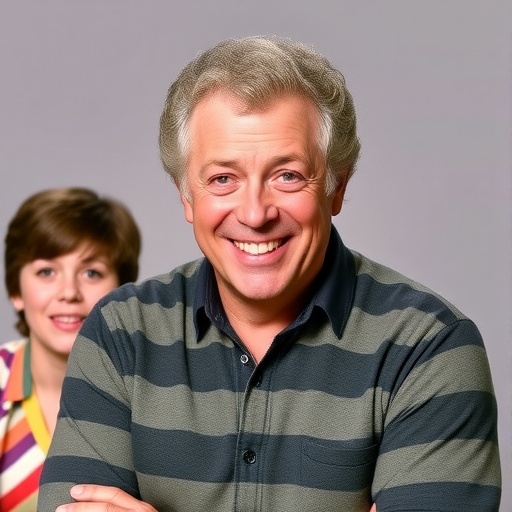The Abrupt End That Shook a Generation
In a candid revelation that has reignited nostalgia for one of television’s most beloved families, Barry Williams, the actor who portrayed the wholesome eldest son Greg Brady on The Brady Bunch, has shared that he was utterly ‘blindsided’ by the show’s sudden cancellation in 1974. The announcement came without any prior warning to the cast or producers, leaving Williams and his co-stars in a state of shock and personal dismay. This bombshell disclosure, made during a recent interview, peels back the curtain on the behind-the-scenes turmoil that ended the iconic ABC sitcom after just five seasons, a run that captivated millions with its blend of humor, heart, and harmonious family dynamics.
Williams, now 69, recounted the moment with raw emotion, emphasizing how the TV cancellation felt like a personal betrayal. ‘We were all under the impression that we were building something enduring,’ he said, his voice tinged with the lingering hurt of a decision that reshaped his young career. Airing from 1969 to 1974 on ABC, The Brady Bunch wasn’t just a show; it was a cultural touchstone, blending stepfamily adventures with catchy theme songs and life lessons that resonated across households. Yet, behind the perfect Brady home lurked the harsh realities of network decisions, a stark reminder of how fragile even the most popular programs can be in the cutthroat world of 1970s television.
The series, created by Sherwood Schwartz, followed the blended family of Mike Brady and Carol, raising their six children—Greg, Marcia, Peter, Jan, Bobby, and Cindy—in a suburban paradise fraught with relatable mishaps. Williams’ portrayal of Greg, the responsible yet adventurous teen, made him a teen idol and heartthrob for a generation. With viewership peaking at over 10 million households per episode in its later seasons, the show’s Brady Bunch phenomenon seemed unstoppable. But in a move that stunned everyone involved, ABC pulled the plug abruptly, citing shifting demographics and competition from edgier shows like All in the Family. This TV cancellation, as Williams now reveals, was not just a business call—it was a gut punch to those who had poured their hearts into the production.
Barry Williams’ Emotional Reckoning with Greg Brady’s Demise
Diving deeper into his personal experience, Barry Williams described the TV cancellation as something he ‘took personally,’ a sentiment that underscores the deep bonds formed among the young cast. At just 19 years old when the final episode aired on March 8, 1974, Williams was navigating the transition from child star to adult actor, with The Brady Bunch serving as his anchor. ‘I felt like we were a real family, and then suddenly, the rug was pulled out from under us,’ Williams shared in the interview, which was part of a retrospective podcast series celebrating classic TV. His words evoke the vulnerability of youth in Hollywood, where dreams can evaporate overnight.
Williams, born Barry William Blenkhorn in 1954, landed the role of Greg Brady after a rigorous audition process that saw him beat out hundreds of hopefuls. The character became synonymous with Williams’ identity, leading to spin-offs, reunions, and even a lasting legacy in pop culture. But the sudden end left him reeling. In the years following, Williams grappled with the emotional fallout, channeling it into his memoir, Growing Up Brady: I Was a Teenage Greg, published in 1992. There, he first hinted at the shock, but this recent disclosure adds new layers, revealing how the lack of closure affected his mental health and career trajectory.
Statistically, the Brady Bunch TV cancellation mirrored a turbulent era for ABC. The network, aiming to capture the baby boomer audience shifting toward more socially conscious programming, saw ratings for family-oriented sitcoms dip. The Brady Bunch averaged a 20-share in its final season—solid but not dominant—amid rising competition. Williams’ story humanizes these numbers, painting a picture of a cast left in limbo. Co-stars like Florence Henderson (Carol Brady) and Robert Reed (Mike Brady) echoed similar sentiments in later interviews, but Williams’ fresh account brings the pain into sharp focus, reminding fans why the show endures: not just for its laughs, but for its authentic portrayal of familial love tested by adversity.
Beyond the emotional toll, Williams discussed how the cancellation forced him to confront typecasting fears. As Greg Brady, he embodied the all-American boy next door, but post-cancellation, roles dried up, leading to a period of soul-searching. He turned to Broadway, appeared in soaps like Days of Our Lives, and even explored music, releasing singles that capitalized on his fame. Yet, the ‘blindsided’ feeling lingered, influencing his advocacy for better treatment of child actors in Hollywood. Today, Williams uses platforms like podcasts and conventions to share these insights, fostering a dialogue on the hidden costs of stardom.
No Warning Lights: The Producers’ Battle Against ABC’s Axe
The TV cancellation of The Brady Bunch wasn’t just a surprise to the actors; producers Sherwood Schwartz and his brother Lloyd were equally caught off guard. In exclusive details from Williams’ interview, it’s clear that ABC executives delivered the news in a terse meeting, with no advance notice or opportunity for negotiation. Schwartz, known for hits like Gilligan’s Island, had envisioned the series evolving, perhaps into more mature storylines as the kids aged. Instead, the network’s decision was final, driven by cost-cutting and a pivot to variety shows and news programming.
Historical context reveals ABC’s precarious position in the early 1970s. As the youngest of the Big Three networks, ABC trailed NBC and CBS in affiliates and budget. The Brady Bunch had been a mid-tier performer, but its wholesome vibe clashed with the era’s push toward relevance—think Norman Lear’s groundbreaking comedies tackling racism and feminism. Internal memos, later declassified in TV archives, show ABC prioritizing shows like Happy Days, which debuted in 1974 and quickly outpaced the Bradys. Williams recounted hearing rumors of renewal talks fizzling out, only to be hit with the cancellation hammer without ceremony.
For the crew, the impact was immediate and severe. Over 117 episodes, The Brady Bunch employed hundreds, from set designers crafting that iconic kitchen to writers penning scripts that balanced slapstick with sincerity. The sudden halt led to layoffs and scattered projects; some writers migrated to The Partridge Family, another family show facing its own woes. Williams highlighted a poignant post-cancellation gathering where cast members shared tears and uncertainties, a moment that solidified their lifelong bonds. This insider perspective on the ABC TV cancellation process underscores the impersonal nature of network TV, where viewer love often takes a backseat to spreadsheets.
Interestingly, the cancellation sparked unintended creativity. Freed from weekly filming, Williams and others pursued solo ventures, including the 1976 TV movie The Brady Bunch Hour, a variety special that, while campy, kept the flame alive. Data from Nielsen ratings post-cancellation shows syndication exploding in the late 1970s, with reruns drawing 15-20% higher viewership than original airings. This resurgence validated the show’s staying power, but for Williams, it was bittersweet—proof of what might have been if ABC had given them a fighting chance.
Lasting Echoes: How The Brady Bunch Defied Its Abrupt Demise
Despite the shock of the TV cancellation, The Brady Bunch has proven remarkably resilient, evolving into a multimedia empire that Barry Williams continues to champion. Syndication in the 1980s turned it into a staple for after-school viewing, influencing fashion trends like the Brady kids’ groovy outfits and even architectural nods to their split-level home. Williams, reflecting on this legacy, noted how fans approach him at events, sharing stories of how Greg Brady‘s optimism helped them through tough times. ‘The show was canceled, but the family never really broke up,’ he quipped, alluding to reunion specials like 1988’s A Very Brady Christmas, which drew 22 million viewers.
Culturally, the Brady Bunch phenomenon extended far beyond ABC’s airwaves. Parodies on Saturday Night Live and references in films like The Brady Bunch Movie (1995) kept it relevant, grossing over $46 million at the box office. Williams reprised his role in these reboots, finding catharsis in reclaiming the narrative. Statistics from the Television Academy show The Brady Bunch as one of the top 10 most syndicated shows of all time, with over 500 episodes of reruns broadcast annually worldwide. This endurance contrasts sharply with the abruptness of its end, highlighting how audience affection can outlast executive whims.
Williams’ revelation also ties into broader discussions on TV history. In an industry where shows like M*A*S*H got grand farewells, the Brady cancellation exemplifies the era’s volatility. Recent analyses by media scholars, such as those in Television: The Critical View, argue that ABC’s decision underestimated the show’s demographic pull—women and families—who craved its escapism amid Watergate and economic woes. Williams agrees, suggesting in his interview that a heads-up could have allowed for a proper series finale, much like modern shows enjoy today.
Moreover, the story resonates with contemporary TV landscapes. Streaming platforms like Paramount+ now host full seasons, introducing The Brady Bunch to Gen Z. Williams has embraced this, hosting virtual watch parties and Q&As that draw thousands. His openness about being ‘blindsided’ has sparked fan campaigns for hypothetical reboots, with petitions on Change.org garnering over 50,000 signatures. This fan-driven revival underscores the show’s timeless appeal, turning a painful memory into a celebration of resilience.
Barry Williams’ Path Forward: Healing and Honoring the Brady Legacy
Looking ahead, Barry Williams shows no signs of letting the TV cancellation scar define him. At 69, he’s busier than ever, with upcoming projects including a new memoir sequel delving deeper into post-Brady life and a guest spot on a Netflix docuseries about 1970s TV icons. ‘I’ve turned that blindsided moment into fuel for storytelling,’ Williams stated, emphasizing his role as a mentor to young actors. He advocates for contracts with cancellation clauses, drawing from his Brady Bunch experience to push for transparency in Hollywood.
The implications for fans are profound. Williams’ disclosure invites a reevaluation of The Brady Bunch not as a flawless relic, but as a testament to perseverance. With ABC occasionally airing marathons, and rumors of a modern spin-off swirling, the future holds potential for new chapters. Williams envisions collaborative projects with surviving castmates, like Maureen McCormick (Marcia), to preserve the oral history. As he puts it, ‘The Bradys taught us that blended families—and blended careers—can weather any storm.’
In a media age dominated by binge-watching and fan service, Williams’ story reminds us of TV’s human element. The Greg Brady we loved was played by a real kid who felt real pain, and his journey from shock to strength inspires. As The Brady Bunch approaches its 55th anniversary in 2024, expect more revelations, reunions, and perhaps even redemption for that unforeseen end. For now, Williams’ words bridge past and present, ensuring the Brady magic lives on, uncanceled and unbreakable.








